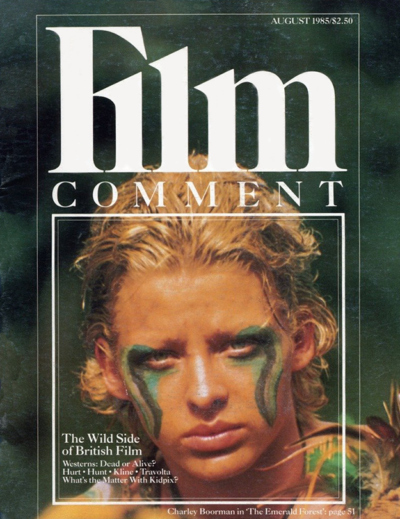IS THERE LIFE AFTER KIDPIX?
Pouty boys and horny girls face the loneliness of knowing it all before they’re old enough to buy a drink. These heroes and heroines stock the last 493 kidpix that Hollywood has ground out for a young audience desperate to believe in itself. But are these films true to life, or to art? Armond White scans the youth-cult movies, and has their number: Seventeen.
WESTERNS: DEAD OR ALIVE?
From out of the West come the thundering archetypes of a genre long thought dead. With a hearty hi-yo Silverado, that Pale Rider called the western makes a comeback. Stephen Harvey cauterizes three new films in white hats. Two Silverado stars say their piece: Linda Hunt (by Marcia Pally) and Kevin Kline (Harvey).
MIDSECTION: MAVERICKS
Talent helps, but if you want to succeed at the film dodge—in Old or New Hollywood, or in the avant garde—you’ve got to be just plain stubborn. Herewith, three portraits of movie mavericks: the hotshots of the Seventies, now scrounging to make pictures on their own terms (by Stephen Farber); the late Hollis Frampton, profiled by friend and critic Mitch Tuchman; and screenwriting vet Niven Busch, who spent 20 years in the Golden Age, and has the scars and stories to prove it (David Thomson interview).
SCHIZO BRITS
In British films, a nation argues with itself. Big pictures celebrate the midday of Empire (Gandhi, A Passage to India); small ones see gloom through gimlet eyes (Wetherby, Dance With a Stranger). Our Harlan Kennedy figures the Brits are bonkers .
JOURNALS
Dan Yakir talks with John Travolta (Perfect) and Nicholas Meyer (Volunteers). Frederic Rosen tracks Arthur Penn’s new thriller Target.
EDGAR REITZ ON ‘HEIMAT’
At 16 hours, Heimat is the most widely acclaimed film of the year. Its creator tells Gideon Bachman of the film’s painful, inspiring genesis.
DAN WAKEFIELD’S GUILTY PLEASURES
Dan Wakefield, whose new novel is about a writer who goes to Hollywood, was there from early days. Cagney and Pat O’Brien were with him.
WILLIAM HURTS
This volatile and voluble star met a tough challenge—playing the Latino queen in Kiss of the Spider Woman—and won the best actor prize at Cannes. A chat with Dan Yakir.
PUMP AND GRIND
George Butler’s Pumping Iron II: The Women raises some piquant questions: What is beauty? What is ‘feminine’? What’s a documentary? Does Bev Francis take steroids? Marcia Pally’s answers are just as provocative.
JUNIOR ACHIEVEMENT
Dad was a terrific director; George Stevens, Jr. paid him the loveliest tribute possible. By Ron Haver.
WRITING IN SILENCE
Richard Corliss profiles the pioneer scenarists who found a place of honor (and anonymity) in silent movies. As always, though, the director was king; you will see the evidence in a 1923 satire starring D.W. Griffith and introduced by Richard Schickel.
PENSÉES: SINS OF CINEMACY
Kids don’t read, but they sure know movies. Richmond Crinkley analyzes the new “cinemate” generation.
INDUSTRY: STORY EDITORS
The full treatment, by Tom Stempel.
BACK PAGE: QUIZ #14




